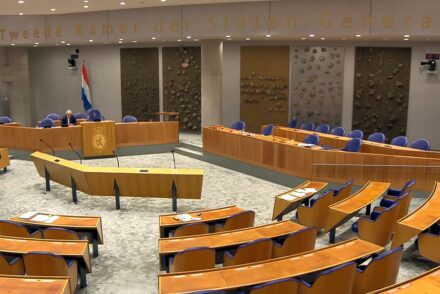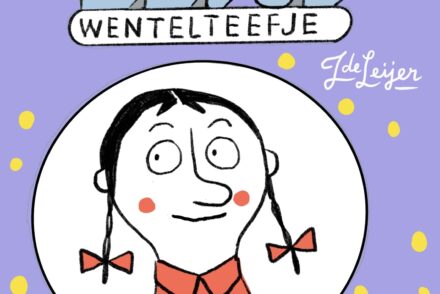25 years after the genocide, Rwandans look back: ‘We must forgive, but never forget’
At this time in 1994, a tragedy beyond measure was unfolding in Rwanda. Twenty-five years on, the memory of the genocide against the Tutsi is kept alive by Rwandans everywhere—from Kigali to Tilburg. We spoke with genocide survivor Mama Lambert and student Nick Rurangwa Nshimiyen about the importance of remembering what happened in Rwanda during those one hundred days of slaughter.
Beata Mukarubuga, a Tutsi woman, saw nearly her entire family murdered in the 1994 genocide. She survived the killings, hiding in the bushes for months with her one-year-old son Lambert strapped on her back.
When the genocide ended in July 1994, she was deeply traumatized. She felt that the name Beata, meaning ‘blessed’, no longer belonged to her. Her old name belonged to her old life, when she still had a home, a happy marriage and eight healthy children. Robbed of those blessings, she preferred to be called Mama Lambert. Even though the genocide had left her utterly destroyed, she was still that—the mother of Lambert, the baby she had carried from bush to bush to escape the génocidaires who had slaughtered five of her children, her husband, her parents, her sister, her brother, and so many others.
“The genocide took everything from me”
Earlier this month, Rwanda began its annual one hundred days of mourning, coinciding with the duration of the genocide. Mama Lambert visited the Tilburg University campus to attend a commemoration event organized by students and researchers who are part of the team behind Bèkske: Rwandan Empowerment Coffee.
Mama Lambert spoke about the 1994 massacres and rapes, as well as post-genocide reconciliation. “It’s still emotional for me to speak about what happened. The genocide took everything from me,” she told students, staff and guests gathered at campus theater Black Box. “Can you imagine someone killing your child with a machete? And then your second child, your third child, your fourth child, your fifth child?”

Anne-Marie de Brouwer, Mama Lambert, Eefje de Volder and rector Emile Aarts at the commemoration event on campus
Trauma counseling
A day prior to the commemoration event, we met Mama Lambert for an interview at the home of researcher Anne-Marie de Brouwer, whose work at IMPACT focuses on conflict-related sexual violence and human trafficking. Anne-Marie de Brouwer has known Mama Lambert for years. She is the chair and co-founder of Mukomeze, a foundation in the Netherlands that works with Solace Ministries in Rwanda, where Mama Lambert is a trauma counselor.
Mukomeze has been supporting Rwandan women who survived sexual violence during the genocide for over a decade. One of the projects that originated with the foundation is the Bèkske coffee project, which helps survivors of genocidal sexual violence rebuild their lives and regain economic autonomy through the farming of coffee beans. The coffee is sold in the Netherlands, with a large chunk of the profits going directly to the farmers. As a trauma counselor, Mama Lambert helps the women who work on the coffee farm—and thousands of other Rwandan women—in coming to terms with the horrors of the past.
While Anne-Marie de Brouwer poured us some freshly-brewed Bèkske coffee, Mama Lambert explained how she was able to heal her wounds of the past. She was sheltered by Solace Ministries, a grassroots organization run by genocide survivors. “After the genocide, I was traumatized. My family was murdered, my house destroyed, my cows eaten. Solace Ministries comforted me. They provided counseling, which is the first step in the process of healing. Later, I decided to give comfort to others as it had been given to me. I became a counselor.”
Making peace with the past
Mama Lambert has been the head of counseling of Solace Ministries since 2002. Her work remains needed—twenty-five years after the genocide, making peace with the past is a process that is still ongoing in Rwanda. Rwanda is a small country, where victims and perpetrators of the genocide live side by side.
The 1994 genocide against the Tutsi in Rwanda
On April 6, 1994, an airplane carrying the Hutu president Juvenal Habyarimana was shot down in Rwanda. This marked the beginning of the systematic killing of the country’s Tutsi minority. The killings were orchestrated by the extremist Hutu government, with calls to slaughter aired on national radio stations.
In July 1994, after one hundred days of mass killings and rapes, the genocide was halted by a Tutsi guerrilla army led by Rwanda’s current president, Paul Kagame. By the time the genocide ended, an estimated one million people were dead—mostly Tutsi men, women and children, along with moderate Hutus who had refused to participate in the killings. An estimated 250,000 to 500,000 women and girls were violently raped during the genocide, as well as an unknown number of men and boys.According to Mama Lambert, forgiveness is the only way forward for Rwandans. But forgiving the unforgivable is not an easy thing to do. “Forgiveness is a process, it’s not instant. That’s why counseling is so important for survivors. In order to forgive, they must be able to share their testimonies. It’s important to talk about what happened, and it’s important to be listened to.”
“I told the man who killed my children: I forgive you”
Mama Lambert has forgiven the murderers of her family. For her, too, it was a process. “After the genocide, the man who killed my children wrote me a letter. At first, I didn’t respond,” she said. “But when I was ready, I told him: I forgive you. From that moment, I felt peace in my heart. When you release your anger, you release your heart.”
No more Hutu and Tutsi
Since 1994, Rwanda has made an extraordinary recovery. “When you arrive in Kigali, you can see the change,” Mama Lambert said. Over the past few decades, the country has lifted itself out of poverty, pushed for gender equality, raised the standard of living, and built a health system that covers more than 90 percent of the population. “After the genocide, we decided to build a new Rwanda. A Rwanda without conflict or ethnic distinction. We don’t call ourselves Tutsi or Hutu anymore—we are all Rwandans now.”

Mama Lambert
While making remarkable strides economically, socially and politically, Rwanda has never stopped remembering where it came from. With genocide memorials in almost every community and an annual mourning period spanning three months, reminders of the country’s darkest days are always present.
For outsiders, trying to forget the past may seem a less painful way to move on from the genocide, perhaps making life a little more bearable in a country where people’s entire families were murdered by their neighbors. But for Rwandans, remembering the genocide is a crucial part of individual and national healing.
“Remembering is not the same as holding on to anger or being stuck in the past,” Mama Lambert explained. “We must forgive, but we must never forget. We cannot build a good future if we don’t continue to remember what happened.”
A sad month
The remembrance of the genocide is ingrained in the lives of all Rwandans, including those born after 1994 or living in diaspora. Nick Rurangwa Nshimiyen, who studies Global Law at Tilburg University, was born in the Netherlands and raised in Belgium. “Even though I didn’t grow up in Rwanda, April is a sad month for me. It’s a sad month for all Rwandans—it’s when we remember the onset of the genocide and the family members we lost.”
Nick was unable to attend the 25th commemoration of the genocide against the Tutsi held on campus, since he is currently on exchange in the United States. In between lectures at the University of Connecticut Law School, he explained to us by phone how he experienced the commemoration of the 1994 genocide as he grew up in Belgium.
“I’m proud to be Rwandan. It means being a survivor”
“In Belgium, members of the Rwandan diaspora come together each year for the annual commemoration period, which we call Kwibuka. From my experience, people commemorate in different ways. One of the things we do in Belgium’s big cities, where there are large communities of Rwandans, is join in long walks to remember the victims of the genocide.”
A country of survivors

Nick Rurangwa Nshimiyen in Rwanda
Nick was a teenager when he first set foot on Rwandan soil. “That was the best time of my life. The moment we stepped out of the plane in Rwanda, I had this incredible sensation of being home. Everyone was so welcoming. There were only good vibes,” he recalled. “I felt like I was where I’m meant to be.”
Since then, Nick has returned to Rwanda several times. As a participant of Tilburg University’s honors program, he is setting up a student-run project in Rwanda to offer summer schools to teach Rwandan youth interested in ICT entrepreneurial skills. “For me, this project is an opportunity to use my education to contribute to the development of Rwanda.”
“I know a lot of people think of Rwanda as a dark place because of the genocide,” Nick said. “But Rwanda has evolved from its suffering in tremendous ways. After being torn by genocide, Rwandans found the strength to mourn as a community and to grow stronger together. If you look at Rwanda today, we’ve made so much progress.”
For Rwandans everywhere, the commemoration period is more than a time to mourn the lives lost in the genocide—it’s also a time to look back at the recovery Rwanda has made as a nation since 1994. Nick: “I’m proud to be Rwandan. It means being a survivor, being resilient. Rwanda doesn’t treat its past as an excuse to justify wrongdoings of the present, but as a reason to build a better future.”
Bèkske: Rwandan Empowerment Coffee
In the green hills of southern Rwanda, coffee beans for the Dutch market are cultivated by a group of women who survived sexual violence during the 1994 genocide. By working on the Bèkske coffee farm, the women regain economic autonomy and find support with each other.
Bèkske: Rwandan Empowerment Coffee is run by Anne-Marie de Brouwer, Eefje de Volder and Luan Vercruysse. Students participating in Tilburg University’s Outreaching Honors Program contribute to the coffee project by raising awareness and sales in and around Tilburg.
In April and May, Bèkske coffee is served in cafes across Tilburg, including the Esplanade cafe on campus, as part of a 100-day commemoration campaign held by Bèkske. The commemoration of the genocide at Black Box, where Mama Lambert as well as the Rwandan ambassador to the Netherlands were among the speakers, was the opening event of the 100-day campaign.

Students of the Honors Outreaching Program visit the Bèkske coffee farm in Rwanda, summer 2018
Further reading
Mama Lambert shared her life story in a gripping biography of loss and resilience, For those who do not believe in miracles (2015). The book was also published in Dutch, carrying the title Voor wie niet in wonderen gelooft. The biography was republished this month to include the most recent years of Mama Lambert’s life.
Anne-Marie de Brouwer and Eefje de Volder collected the stories of seventeen Rwandan survivors of genocidal sexual violence, sixteen women and one man, in the books The Men Who Killed Me (2009) and And I Live On (2019).
Advertentie.







